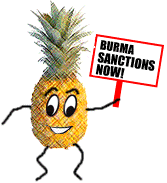Wednesday, July 12, 2006
Human Rigths Abuses in Burma (part 6)
Slave Labor and Child Soldiers-Burma’s industry is state controlled and often run on slave labor; usually using ethnic minorities or political prisoners. Since the regimes takeover in 1962 the use of Burmese children being used to build roads has been notorious. The United Nations International Labor Organization has accused the regime of a 'crime against humanity' for its systematic use of forced labor, used by the regime “to encourage private investment in infrastructure development, public sector works and tourism projects”. [1] The use of slave labor in any circumstances is barbaric but in its use by a government in the 21st century the horrific nature of slavery is exemplified. Even foreign investment in the country relies on forced labor; in 2005 Total Oil paid six villagers the equivalent of €3 million in order for them to withdraw from their long running court case accusing Total of forcing them to work on their Yanda pipeline. This action by Total is indicative that they were aware the court case would not find verdict in their favor and would compromise the ongoing use of forced labor on their pipeline. Due to large presence of forced labor in both the tourism and investment sectors in Burma the NLD has called on all supporters of democracy to boycott both.
As well as widespread slavery the Burmese regime are responsible for the highest number of child soldiers in the world; currently standing at 70 000 [2]. Children as young as 11 are picked up from market places and bus stops, taken from their families, regularly beaten and threatened with physical punishment if they try to escape. They are then forced to commit human rights abuses against civilian and engage in combat against ethnic militia and Thai insurgents.
"Burma's army preys on children, using threats, intimidation and often violence to force young boys to become soldiers. To be a boy in Burma today means facing the constant risk of being picked up off the street, forced to commit atrocities against villagers, and never seeing your family again."
International law recognizes the recruitment of any child under the age of fifteen as a war crime and the UN General Assembly prohibits the forced recruitment or the engaging in combat of any child under eighteen; a clear reason why the regime has not yet signed the Rights of the Child Protocol. [3]
[1] Burma Campaign UK
[2] Nation Coalition Government of the Union of Burma (in exile)
[3] Human Rights Watch
As well as widespread slavery the Burmese regime are responsible for the highest number of child soldiers in the world; currently standing at 70 000 [2]. Children as young as 11 are picked up from market places and bus stops, taken from their families, regularly beaten and threatened with physical punishment if they try to escape. They are then forced to commit human rights abuses against civilian and engage in combat against ethnic militia and Thai insurgents.
"Burma's army preys on children, using threats, intimidation and often violence to force young boys to become soldiers. To be a boy in Burma today means facing the constant risk of being picked up off the street, forced to commit atrocities against villagers, and never seeing your family again."
International law recognizes the recruitment of any child under the age of fifteen as a war crime and the UN General Assembly prohibits the forced recruitment or the engaging in combat of any child under eighteen; a clear reason why the regime has not yet signed the Rights of the Child Protocol. [3]
[1] Burma Campaign UK
[2] Nation Coalition Government of the Union of Burma (in exile)
[3] Human Rights Watch





